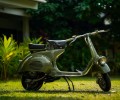Why the Vespa Faro Basso Is the Holy Grail for Collectors
.jpg)
The Vespa Faro Basso, literally “low headlight Vespa”, is widely regarded as the scooter world’s crown jewel. For collectors asking why the Vespa Faro Basso is the holy grail for collectors, the answer blends timeless design, genuine rarity, and cultural impact. Born in post‑war Italy and immortalized on screen, this wideframe Vespa embodies a living history that still turns heads today. In this guide, you’ll learn the design cues that define it, the story behind its fame, why surviving examples are scarce, and practical tips to find and own one, including road‑ready builds by Scooter99.
Iconic Design: The “Low Headlight” Vespa
The Faro Basso’s signature is the headlight mounted on the front fender rather than the handlebars. Combined with a curvy wideframe steel body and period‑correct saddle seats, the result is a clean, elegant silhouette that enthusiasts recognize instantly.
- Low‑mounted headlight → unmistakable vintage look
- Wideframe body → solid steel construction with flowing lines
- Split/saddle seats → classic Italian styling of the 1950s
History & Cultural Significance
Emerging from 1940s–1950s Italy, the Faro Basso helped mobilize a nation and soon became a global style icon. In Roman Holiday (1953), Audrey Hepburn famously rode a Vespa 125 with the low headlight — a scene that cemented the Faro Basso’s place in pop culture and in collectors’ hearts.
- 1946 → First Vespa prototypes
- Late 1940s-mid-1950s → Faro Basso era (wideframe, low light)
- 1953 → Cinematic fame in Roman Holiday
.jpg)
.jpg)
.jpg)
Why It’s So Rare (and Valuable)
Seven decades on, intact Faro Bassos are scarce. Many were used daily, heavily modified, or scrapped. Authentic survivors — especially outside Europe — are difficult to source. That scarcity, plus demand, drives value.
Riding a Legend: Experience Meets History
A sympathetically restored Faro Basso is a joy to ride — a gentle, evocative soundtrack from the two‑stroke engine and a steady wideframe stance. It’s both a display‑worthy collectible and a rideable classic for weekends and rallies.
Scooter99 hand‑builds a Vespa Faro Basso 150cc that preserves period style while prioritizing reliability. Explore the listing here: Scooter99 Faro Basso Collectible
Faro Basso vs. Later Vespa Models
| Feature | Vespa Faro Basso (c. 1948–55) | Later Vespa (1956+) |
|---|---|---|
| Headlight | On front fender ("low light") | On handlebars ("Struzzo") |
| Frame | Wideframe steel body | Narrower, lighter bodies |
| Design Appeal | Collectible, elegant curves | More practical, modernized |
| Value Today | High (rare collector’s item) | Varies by model/condition |
How to Acquire One – Collector Tips
- Search globally: many survivors remain in Italy/Spain.
- Verify authenticity: check frame/engine numbers and provenance.
- Join communities: classic Vespa clubs/forums share leads.
- Work with specialists: reputable restorers like Scooter99 offer road‑ready builds.
Watch: Vespa Faro Basso in Action
FAQ: Vespa Faro Basso Collectors’ Questions
What does “Faro Basso” mean?
It’s Italian for “low headlight,” describing the Vespa’s fender‑mounted lamp that defines the model’s iconic look.
Why is the Vespa Faro Basso the holy grail for collectors?
Because it blends rarity, historical significance, and design purity. Surviving examples are scarce and highly desired, which drives value.
Can I ride a Faro Basso regularly?
Yes — if properly restored and maintained. Many owners enjoy weekend rides and rallies. Specialist builds (e.g., Scooter99’s 150cc) emphasize reliability.
Where can I buy one?
Check reputable restorers, auctions, and classic Vespa clubs. See Scooter99’s listing here: Vespa Faro Basso – Scooter99.


-120x100.jpg)
-120x100.jpg)

-520x400.jpg)